|
|
|
Sort Order |
|
|
|
Items / Page
|
|
|
|
|
|
|
| Srl | Item |
| 1 |
ID:
143546
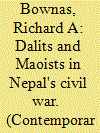

|
|
|
|
|
| Summary/Abstract |
This paper examines the role of Dalits in Nepal's 1996–2006 civil war (or ‘Maoist People's War’) through field research conducted in 2014 in three villages in mid-western and mid-eastern Nepal. The aim of the paper is to illuminate Dalit struggles at the village level which have gone more or less unnoticed both in academic literature and in civil society debate in metropolitan Nepal. Dalit activists in certain locations had been mobilizing under the radar for many years before the People's War. These activists were able to co-opt the Maoist guerrilla movement at the local level to oppose caste discrimination, while arguably, being themselves afterwards co-opted into the Maoists’ national campaign for state power. Empirically, this paper uses detailed findings about changes in caste discrimination practices in three villages where Maoist–Dalit interactions varied greatly to assess the successes and failures of this local level Dalit activism. Theoretically, it parses this episode of activism through debates about the nature of struggles for modernity in rural Nepal, arguing that we might be missing forms of locally grounded ‘modernizing’ struggles that do not fit some typical conceptualizations in social theory.
|
|
|
|
|
|
|
|
|
|
|
|
|
|
|
|
| 2 |
ID:
143545
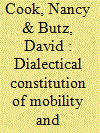

|
|
|
|
|
| Summary/Abstract |
This paper contributes to the critical mobilities literature by analysing local mobilities in Gojal, northern Pakistan in the aftermath of the 2010 Attabad Landslide, in order to develop new insights regarding the dialectical relationship between mobility and immobility. The landslide destroyed a large section of the Karakoram Highway, the region's arterial roadway. Among its disastrous effects was prolonged disruption of the accustomed movements of 20,000 villagers stranded north of the slide. To show how mobility is constituted dialectically in relation to immobility in this context, we detail the social and economic demobilisations Gojalis faced when the highway became impassable, and outline new mobilities they developed to mitigate the disaster of protracted strandedness. Gojalis responded to demobilisation by remobilising, at different scales, along new routes, in different directions and via new mobility platforms, thereby re-establishing circulation as a paradigm of everyday life and demonstrating the paper's argument that disasters are social processes that have simultaneously demobilising and remobilising effects. We conclude that nurturing a multiplicity of mobile relations and practices in several directions and across scales during the disaster recovery process will help Gojalis avoid a similar mobility disaster in the future.
|
|
|
|
|
|
|
|
|
|
|
|
|
|
|
|
| 3 |
ID:
143548


|
|
|
|
|
| Summary/Abstract |
Every year, large numbers of aspiring parents from all over the world come to India to fulfil their dreams of parenthood. They hire an Indian surrogate and with the help of state-of-the-art medical technology, they are able to conceive children they can call their ‘own’. Since 2005, commercial gestational surrogacy in India has become a lucrative industry thanks to the cheap gestational labour, and cheaper medical services. However, this largely unregulated industry is facing roadblocks in international bureaucratic processes. The child born from the arrangement is often caught between conflicting international laws and deemed ‘stateless’. I wish to look at how the state and international laws tend to define persons and relationships by regulating entry and exit, especially through verification and authentication of kin. The world of transparent and visible boundaries – and their policing – is seen through the transnational processes of identifying the stateless children born through the arrangement.
|
|
|
|
|
|
|
|
|
|
|
|
|
|
|
|
| 4 |
ID:
143550
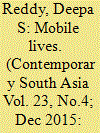

|
|
|
|
|
| Summary/Abstract |
Much has been said and written about the role of the mobile phone in modulating social behaviours and cultural dynamics in India. Far less attention has been paid, however, to emerging cultural narratives about the phone which showcase the active, often troublesome and intrusive role the device plays in increasingly technologically inflected lives and landscapes. How are we to understand these new readings of the phone as itself a protagonist in our cultural lives? This essay uses a series of cultural reference points (movies, plays, news-media reports, popular music) to survey new metaphoric and symbolic terrains that the mobile phone guides us through. The mobile device's character, I argue, is totemic: it acquires the capacity to express desires, aspirations, and ambivalences; invoke social differences, and assert cultural norms. What Indian cultural narratives reveal is the desire for communion with the technologies which now both contain our natures and hold them up to view. The mobile phone plays a critical role in this process of reflection and self-making.
|
|
|
|
|
|
|
|
|
|
|
|
|
|
|
|
| 5 |
ID:
143547
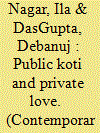

|
|
|
|
|
| Summary/Abstract |
In this paper, we juxtapose the present-day Supreme Court battles over the colonial anti-sodomy provisions in the Indian Penal Code (Section 377), with everyday interpretations of carnal intercourse by kotis and jananas in order to visibilize a whole different social world of carnality. The responses to the law coming from the civil society formations (namely the lesbian, gay, bisexual and transgender (LGBT) rights organizations, HIV/AIDS organizations and women's rights organizations) are the site for the formation of a modern Indian homosexual subject, one who claims her/his rights to love and privacy through the language of human rights and constitutional freedom. We argue that the arrival of the modern rights-bearing homosexual subject is contested by political and religious formations through discourses of sin, unnaturality and proper sexual conduct. The contestation of religious discourse through the discourse of constitutional rights covers over the creative interpretations of religion provided by kotis/jananas. An analysis of the kotis/janana discourse and bodily practices reveals sexual subject formation through the creative reinterpretation of notions such as sin and unnaturality. In conclusion, we contend that the creative interpretations of religious themes by kotis/jananas trouble nationalist religious discourses as well as the constitutional discourses of the LGBT rights movement.
|
|
|
|
|
|
|
|
|
|
|
|
|
|
|
|
| 6 |
ID:
143544
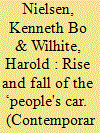

|
|
|
|
|
| Summary/Abstract |
When the Indian car manufacturer Tata Motors launched its new ‘people's car’ in 2008 it was widely predicted to revolutionise automobility in India. Yet seven years after the launch, the car has barely made an impact on the Indian car market and is widely regarded as a failure. This article offers a detailed study of the rise and fall of India's ‘people's car’. Based on a mapping of the changing popular representations and symbolic imaginaries that attach to the car as a means to mobility and an object of identity and social status, we suggest that the car failed neither because it was mediocre, nor because it remained economically out of reach for most Indians. Rather, we argue that its insertion into the lower ranks of a powerful status hierarchy of identity-defining objects precluded it from adequately tapping into new and hegemonic forms of consumer aspiration in ‘New India’.
|
|
|
|
|
|
|
|
|
|
|
|
|
|
|
|
| 7 |
ID:
143549
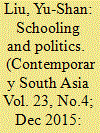

|
|
|
|
|
| Summary/Abstract |
This article presents a study of the textbooks composed and released by the Tibetan Government-in-Exile for the Central School for Tibetans in India. By examining the textbooks on Social Studies and history, it looks at how the Tibetan Government-in-Exile engages with various external and internal ‘others’ in the process of constructing knowledge of the Tibetan nation, and at how it represents Tibetan life to those who were born in exile. It is contended that schooling and power are interrelated, and textbook curricula represent a way in which national power dominates the selection and representation of public knowledge. The article concludes by suggesting that the limits applied by their refugee status to the Tibetans in India has sometimes turned into the energy/force of empowerment, which not only permits flexibility in the shaping of a national identity but creates spaces for negotiating the multiple boundaries.
|
|
|
|
|
|
|
|
|
|
|
|
|
|
|
|
|
|
|
|
|